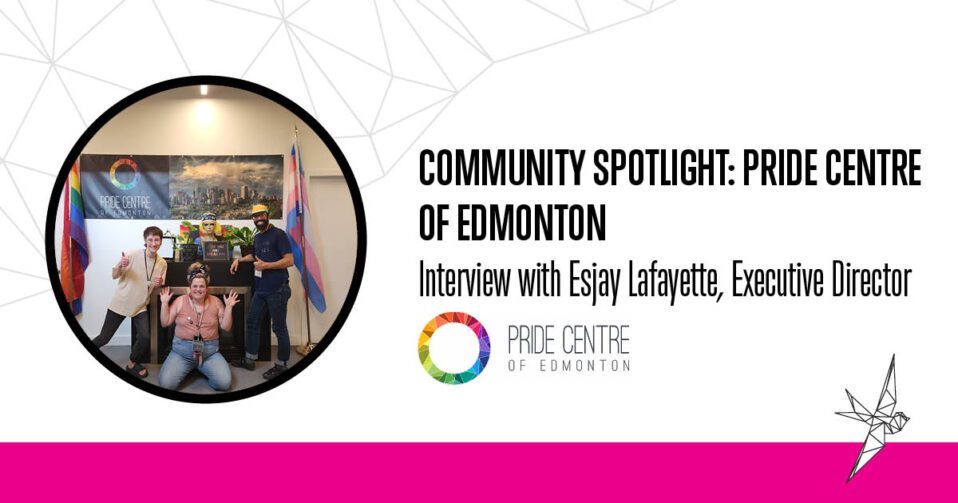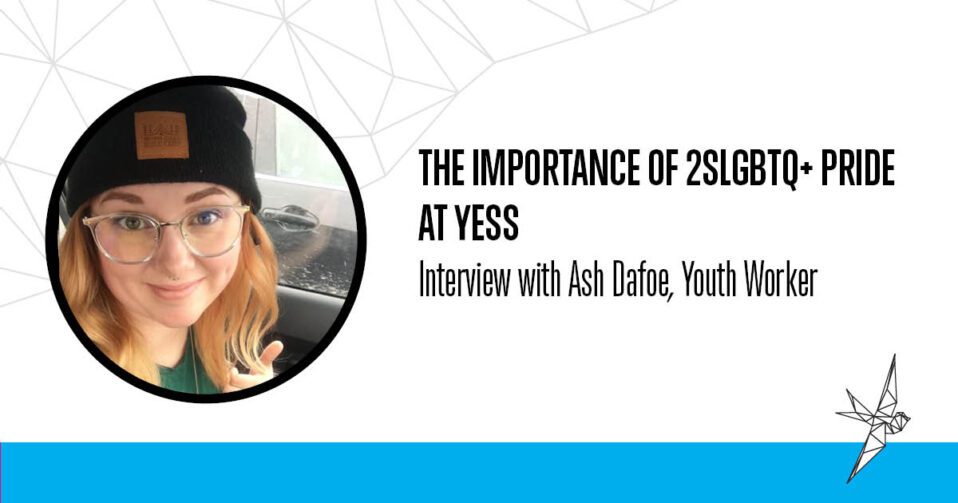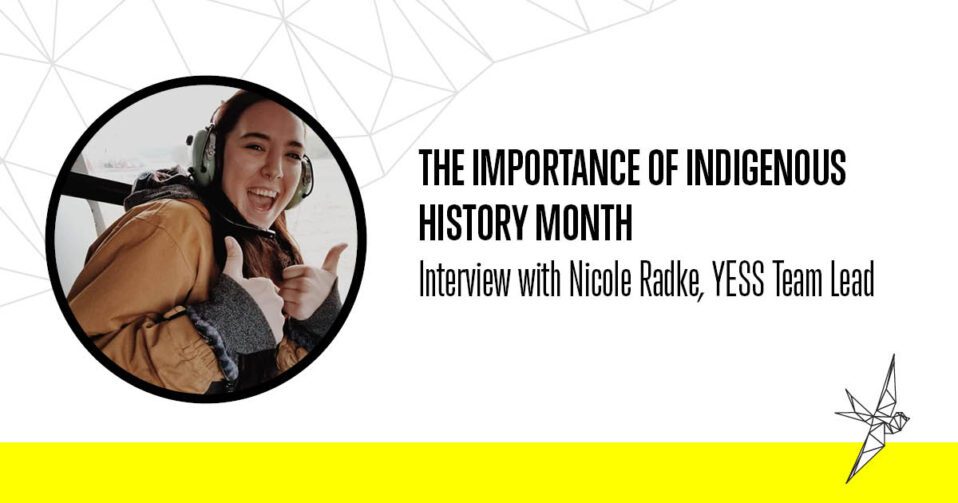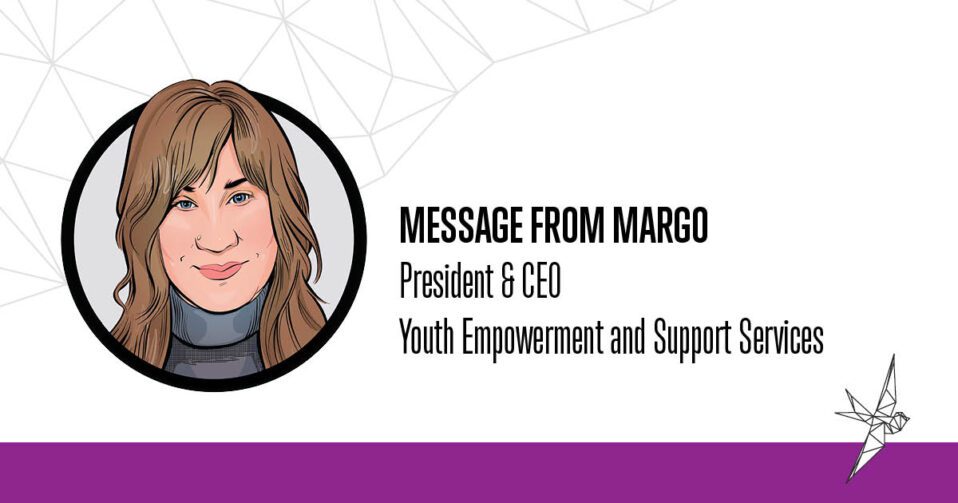Interview with Esjay Lafayette, Executive Director of the Pride Centre of Edmonton
Tell us about yourself and your organization!
My name is Esjay Lafayette (he/him) and I am the Executive Director of the Pride Centre of Edmonton (PCE). I joined the PCE team in 2020 as the Operations Manager and became the ED in October 2022—prior to that, I worked as an electrician but a combination of factors (turning 40, the brink of the COVID-19 pandemic, and the Black Lives Matter movement) motivated me to change careers. I wanted to dedicate my time and skillset to helping the community rather than just making money for an industry, which aligned with an opportunity at the PCE. With the expertise of Pe Metawe Consulting, we are implementing a new strategic plan, committed to the advancement of all 2SLGBTQIA+ people but with a specific focus on three key groups: youth, trans and gender diverse people, and queer asylum seekers and newcomers. When I’m not at work, you can find me hanging out with my partner, two teenagers, and dog, Samson; skateboarding, or watching reruns of M.A.S.H. and The Golden Girls.
What kinds of programs and support does the Pride Centre offer, and how do you see the impact of these programs?
The PCE offers an accessible, trauma-informed, judgement-free space and support systems for people with diverse sexual orientations, gender identities, and gender expressions, and the people in their lives. Our programming includes:
- Free drop-in counselling sessions every Tuesday and Thursday with intern therapists, via our partnership with The Family Centre;
- In-person and virtual youth programming (ages 13 to 24) every Wednesday evening;
- Gender affirming wares programming which includes a community closet – people can access second-hand garments and jewelry, new undergarments, toiletries, and seasonal clothing at absolutely no cost;
- The Binder Exchange Program, which provides community members with gently used binders, gift cards for gender affirming gear, and binder fittings and education for safe wear, free of charge;
- The largest queer library in Alberta, which includes YA fiction and books for children 12 and under, is available to the PCE members — memberships are $25 or sliding scale. We also offer fee waivers, so memberships are accessible to all;
- Support for queer asylum seekers through a partnership with EMCN’s (Edmonton Mennonite Centre for Newcomers) Rainbow Refuge program and LGBTQ+ Newcomers Group, and support letters for refugee hearings and advocacy work;
- Information and referral wayfinding, from housing to food insecurity.
During public hours, people can utilize various equipment and services in our space, including: washing facilities and public washrooms, computers and charges, printing, a games room, a sensory room, art supplies, light refreshments, a community kitchen for baking and cooking, and a community fridge, freezer, and pantry.
At the PCE, we see the impacts of our programming on a daily basis—by meeting people where they are at, we’re able to mitigate a lot of loneliness and isolation. By developing trust and healthy relationships with community members and other organizations, we’re able to build connections, bridge gaps, and remove barriers to resources. Safety is one of our top priorities, therefore the resources and information we provide to community members is vetted to the best of our ability, as are the people and collectives we collaborate with.
Like YESS, the Pride Centre has a long legacy in Edmonton. How does the centre continue to evolve to meet the needs of the community? Why is it important to still have dedicated safe spaces for the 2SLGBTQ+ community?
In addition to our new strategic plan, the PCE has applied for support from Women and Gender Equality Canada (WAGE) to action this plan. We are also working with CASA on a one-year pilot program that will provide community members with access to a registered social worker.
These steps were taken after engaging with community and gathering feedback—our evolution, as both an organization and as frontline workers, is directly linked to listening, observing, believing, and responding accordingly to those who access our services and programs.
Ironically, increased societal acceptance and queer visibility has created more danger for, particularly, identifiable 2SLGBTQIA+ people. The political climate in the States has a contingent in Alberta that is vocally homophobic, especially towards trans and gender diverse folks which creates safety issues. Most of the community members who access the PCE do not have social capital. They are typically lower income with intersecting identities, and their queerness is just the cherry on top of all the other barriers they face. These community members in particular deserve dedicated safe spaces to engage in human connection without the threat of being targeted for who they fundamentally are. It’s also important that a city the size of Edmonton and the surrounding areas provide multiple safe spaces for the queer community that include options for youth under 18 and don’t involve alcohol.
Pride is about activism, but it is also a celebration! What is the impact of the 2SLGBTQ+ community having opportunities to celebrate themselves and share joy?
Just like hurt and pain are integral to the human experience, so is joy and celebration. Growing up in the 80s and 90s, and even more so for those generations before me, there was virtually no diverse queer representation, and limited opportunities to come together and celebrate in safety. Historically, our pain and suffering was focused on. We were often depicted as sick and/or dangerous. My mom struggled immensely when I came out as trans. She worried terribly that I could not live a fulfilling life as a trans person. Her experience is not unique for many guardians of queer folks, but also for queer people themselves. These feelings of despair are directly a result of the absence of balanced, truthful representations of queer people and our experiences. The impact of people openly expressing and celebrating who they are helps counter the myth that being queer equals an unhappy life, it provides hope for people who do not feel safe or ready to come out, and it is a form of speaking truth to power. There are a lot of people in power locally and globally who still don’t want us around, so queer joy and celebration is absolutely a form of resistance.
What is one thing you wish the community knew about the Pride Centre?
There is a lot of diversity amongst the PCE community. We serve a large demographic of people, with many intersecting identities and barriers, but our team is small. There are four core staff members, myself included, striving to make deep, systemic changes in the way our organization operates while continuing to offer frontline services and balance our own wellbeing. However, we are beginning to run on fumes, and our financial situation is currently precarious—donations are greatly needed, as is advocating for the PCE, so we can continue to evolve and expand and increase our capacity, which will ultimately increase the impact of the work we do.





